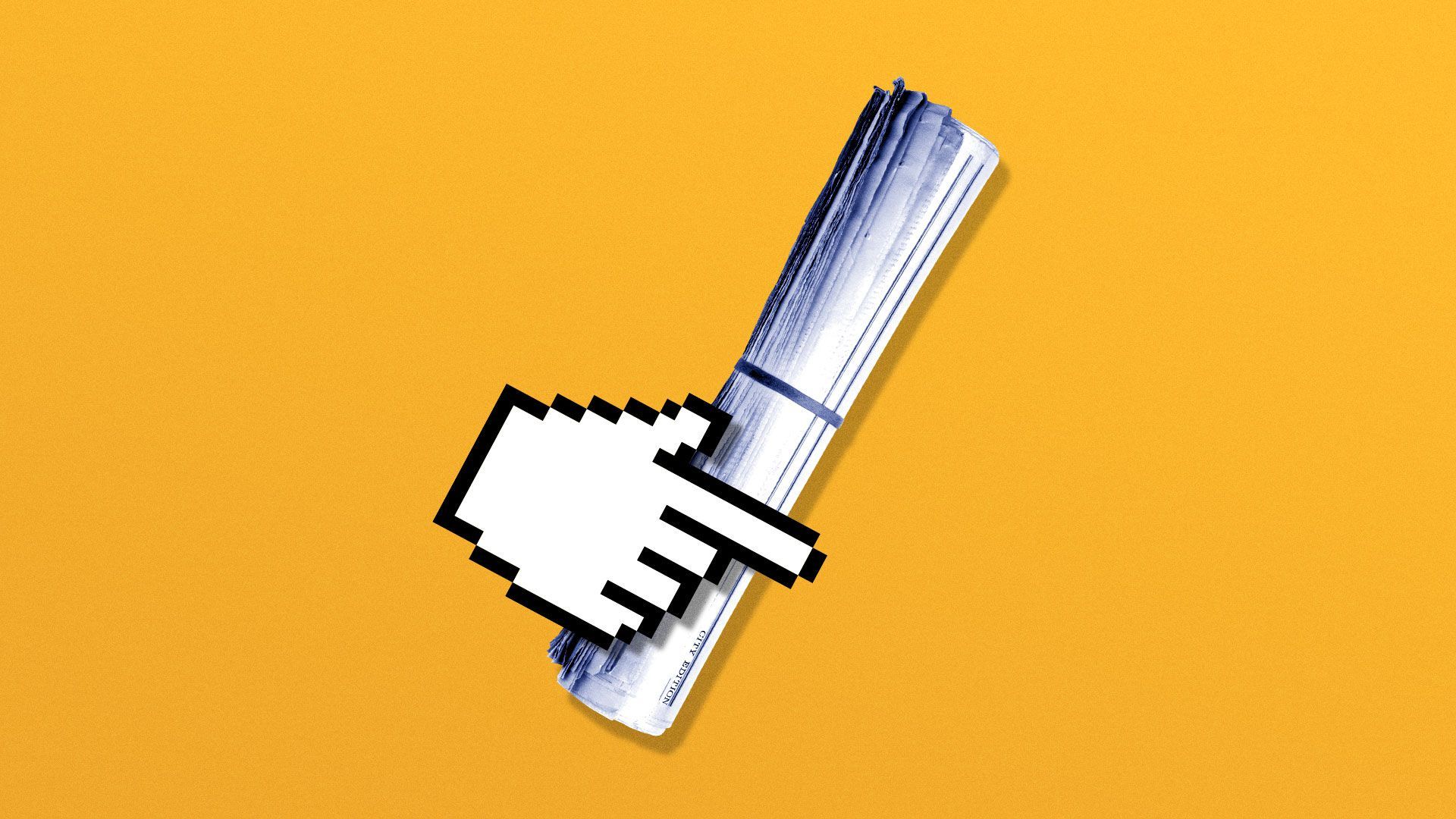February 02, 2021
Today's Media Trends is 1,494 words, a 6-minute read.
Situational awareness: Tokyo 2020 president Yoshiro Mori said Tuesday the Olympics will happen "however coronavirus evolves." That should ease concerns at Comcast/NBCUniversal, which sold over $1.25 billion in ads prior to the postponement.
- The fight between Apple and Facebook has dramatically escalated over the past week. Apple CEO Tim Cook took a public swipe at Facebook CEO Mark Zuckerberg last week. Yesterday, Facebook said is would pre-empt Apple's new privacy warning.
1 big thing: Internet blackouts skyrocket amid global unrest


Internet blackouts are rising around the world when power hangs in the balance, Axios' World editor Dave Lawler and I write.
- Driving the news: Internet disruptions in Myanmar early Monday morning coincided with reports that top politicians, including the country’s de-facto leader Aung San Suu Kyi, were being rounded up by the military.
At least 35 countries have restricted access to the internet or social media platforms at least once since 2019, according to Netblocks, a group which tracks internet freedom. Authorities have used the outages to reduce or prevent unrest — or to hide it from public view.
- Netblocks also reported disruptions in Russian cities during recent protests over the detention of Alexey Navalny. Neighboring Belarus also disrupted the internet during recent protests, as have countries from Algeria to Zimbabwe.
2. Exclusive: Insider Inc. to drop Business Insider name

Business Insider
Beginning Tuesday, Business Insider's logo will no longer appear on Insider.com's website, the publication's CEO and founder Henry Blodget tells Axios.
Why it matters: The changes signal Blodget's ambition to grow the publication significantly to reach a broader population, and that includes investing in verticals outside of traditional business coverage, like travel and lifestyle.
Catch up quick: The name change is the latest evolution in the publication's nearly 15-year history. Blodget started Silicon Alley Insider in 2007 and later changed the name to "The Business Insider" to widen its scope of coverage.
- Blodget says the team decided in 2016 when it launched "Insider" as a corresponding lifestyle brand that it would eventually phase out Business Insider's name.
- It's since has taken many steps to stitch together its "Insider" brand with "Business Insider" on the backend, including combining CMS publishing systems, matching the site formats and combining the editorial and tech teams from both titles.
- Eventually, the URL for Business Insider will be redirected to Insider, but there will still be a dedicated business landing page.
The big picture: Nicholas Carlson, the Global Editor-in-Chief of Insider, tells Axios that business and tech coverage are the core of the company's subscription strategy. The company launched a paywall in 2017.
By the numbers: "Internally, the objective over the next 5 years is to reach a billion people online per month, have a million subscribers and a thousand journalists," Blodget says.
- The combined newsroom today includes 500 journalists globally.
- Carlson says the company plans to hire another 100 journalists this year.
3. It's never been easier to sidestep the press

Illustration: Eniola Odetunde/Axios
A slew of trends are converging to create the perfect opening for powerful people to bypass the media:
- The rise of live-streaming, through apps like Twitch and Instagram Live, has made it easier for powerful people to virtually hold their own, unfiltered, press conferences for thousands of people, whenever they so chose. Rep. Alexandria Ocasio-Cortez told thousands of people last night on Instagram live that she was the victim of sexual assault.
- Independent publishing platforms like Substack are being replicated by several news and tech companies to make it easier for journalists and thought leaders to independently get paid for their thoughts. Both Twitter and Facebook are reportedly working on newsletter products.
- Privately-backed media apps, like ClubHouse, allow tech executives to filter who they want to be a part of certain conversations. "I think it is notable and will be consequential that one of the first successful uses of Clubhouse was to create a backdoor pilot for a venture capital firm’s end run around the mainstream media," Casey Newton wrote in his Platformer newsletter Monday, reflecting on Elon Musk's first big appearance on the platform.
Be smart: "[W]hat this week made obvious to me is that there really are no gatekeepers at all," The Information's Jessica Lessin notes, touching on some of these events. "It’s a nightmare for the news industry that we haven’t begun to come to terms with."
Go deeper: The job of the future is editor in chief
Bonus: Journalist identities hijacked

Illustration: Sarah Grillo/Axios
Newsrooms and established journalists have one key advantage over non-traditional writers and storytellers: institutional authority.
Case-in-point: Bad actors are hijacking journalists' names, photos and bylines to help give credibility to fake storylines or hoaxes on the internet.
- Joe Gould, a Congress reporter for Defense News, tells Axios about how his identity hacked to fuel a right-wing meme conspiracy that the incoming Defense Secretary planned to outsource U.S. defense systems to China.
- The origin of the meme is still unknown, but it started to spread first on Telegram, before spreading to more mainstream platforms like Facebook.
- Defense News’ lawyers contacted Facebook a few days after they were alerted to the situation. The tech giant did try to take the memes down, but many are still floating around the platform. Some are labeled and others are not.
The big picture: These types of identity hacks have become more common as tech companies get better at detecting fake accounts.
Be smart: Situations like these support data that shows that the vast majority of misinformation and disinformation campaigns don't involve manipulated media, but rather, manipulated context.
- Worthy of your time: How outrageous lies online ruined one man's life via The New York Times.
4. Exclusive: IMC acquires StackCommerce, the "Shopify for media"
/2021/02/01/1612213318712.gif?w=1920)
Illustration: Aïda Amer/Axios
Integrated Media Company (IMC), the digital media investment arm of private equity giant TPG, has acquired the majority stake in StackCommerce, an e-commerce platform that connects publishers with brands to sell products through content.
Why it matters: "TPG is an investor in a lot of media companies," says Josh Payne, Founder and CEO of StackCommerce. "Those connections are incredibly valuable."
- IMC will acquire a majority stake in StackCommerce, and Payne will retain most of the minority stake. Financial terms of the deal were not disclosed.
- StackCommerce, which brought in $80 million in gross revenue in 2020, saw its business boom in light of pandemic-driven e-commerce demand, Payne says.
The big picture: IMC sees the investment as an opportunity to better integrate e-commerce into the revenue strategies of some of its existing media investments.
Be smart: The affiliate marketing industry isn't new, but the industry is outdated. Most media companies use in-house editors or freelancers to write articles pushing content to Amazon or other big retailers that keep the purchasing data.
What's next: With the investment, Payne is hoping to acquire additional affiliate commerce tools and potentially a few direct-to-consumer brands that StackCommerce can help grow through its commerce platform.
5. Pandemic puts Peak TV on pause


The number of new original scripted series finally declined last year, after growing steadily for the past decade to over 500 new shows in 2019, according to new data from FX Networks Research.
Why it matters: Pandemic-related production delays forced many TV networks and streamers to rely more heavily on unscripted series, like reality shows and animation, as well as licensing shows from foreign networks for U.S. audiences.
- Most traditional TV networks cancelled or postponed their scripted series renewals for 2021.
What to watch: A slew of new entrants into the streaming wars last year will likely help to boost new scripted series development in 2021 as more people are vaccinated.
- For cable and broadcast networks, it no longer makes as much sense to invest in new scripted series for live TV.
The bottom line: The pandemic-related pauses in production have left stuck-at-home consumers antsy for more new hits. But more are on the way.
6. Exclusive: Law&Crime is profitable, plots expansion

Law and Crime Network
Law&Crime Network, the media company owned by entrepreneur Dan Abrams, brought in more than $13 million in revenue last year, up from less than $3 million in 2019. It was profitable for the first time in 2020.
Why it matters: The 55-person company, founded in 2017, is using its success last year to jumpstart its international expansion, Abrams tells Axios.
- The company is in talks with Samsung TV and other smart TV makers to distribute its OTT app on digital TVs outside of the U.S. and Canada.
Catch up quick: Law&Crime is the biggest company within Abrams Media, which also includes sites like Mediaite, TheMarySue.com and WhiskeyRaiders.com.
- The network launched four years ago with an undisclosed funding round from A&E Networks. It's now in discussions with media companies about more investments as it continues to grow.
- Abrams says he has no plans to roll up all of his media properties and sell them altogether, rather, "I think the key is finding strategic partners," he notes. "We are in those discussions."
What's next: The company is in the process of bringing on 5 new true crime podcasts to its network.
7. App rush: Talent over trash
Amid the sea of pollution on social media, another class of apps is soaring in popularity: The creators are paid, putting a premium on talent instead of just noise, Axios' Ashley Gold and I write.
- Why it matters: New data shows that the creator-economy apps, like TikTok and OnlyFans, are commanding much more user interest than traditional social media. Nearly every major app geared toward content creators saw significant increases in downloads during the pandemic.
The big picture: It's a contrast to platforms like Facebook that are mostly powered by unpaid posts and interactions by everyday users.
8. Scoop: Spectator trademark fight

On the left is the latest issue of The Spectator U.S. edition. On the right is a screen shot from the home page of the American Spectator magazine.
The U.S. version of the Spectator, the world’s oldest English-language magazine, is being sued by the American Spectator Foundation for trademark infringement around its name, sources tell Axios.
Why it matters: Until this lawsuit, sources say the two titles had a mostly friendly relationship for the past four decades.
Be smart: The two outlets don't have similar content, just similar names. The Spectator is less ideological, more global and covers more arts and culture. The American Spectator has long focused on political analysis in America with a conservative lens.
- Both have been in operation in the U.S. in some capacity for many years, making the timing of the lawsuit notable.

